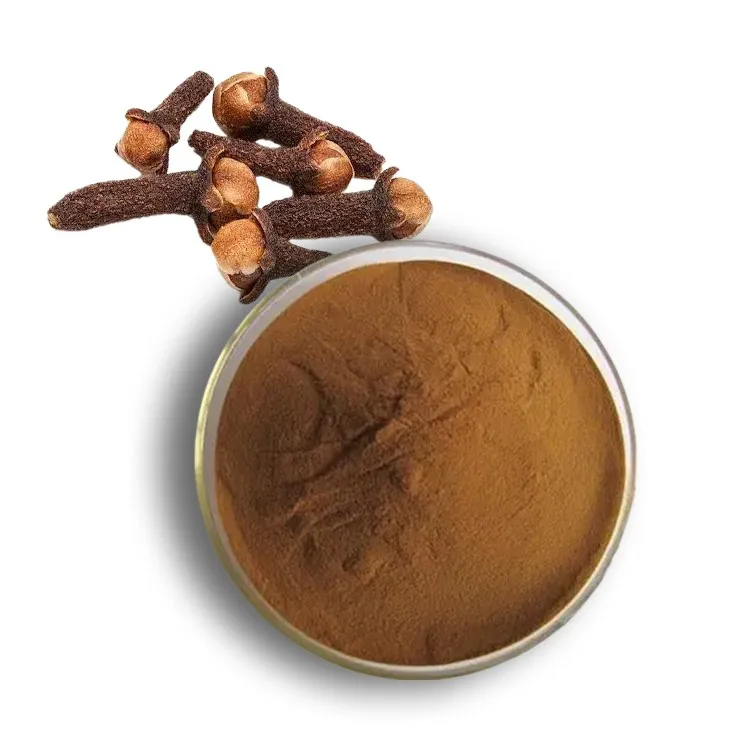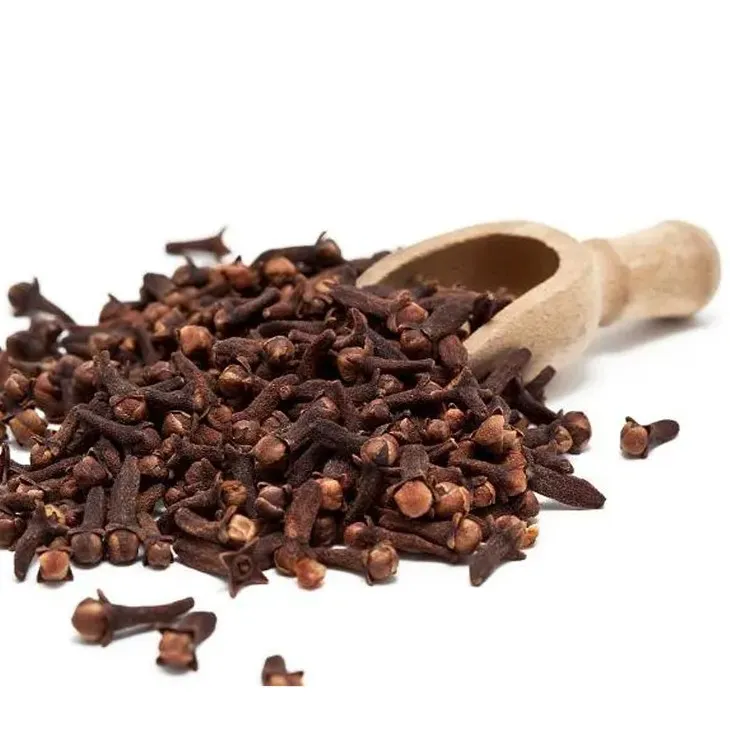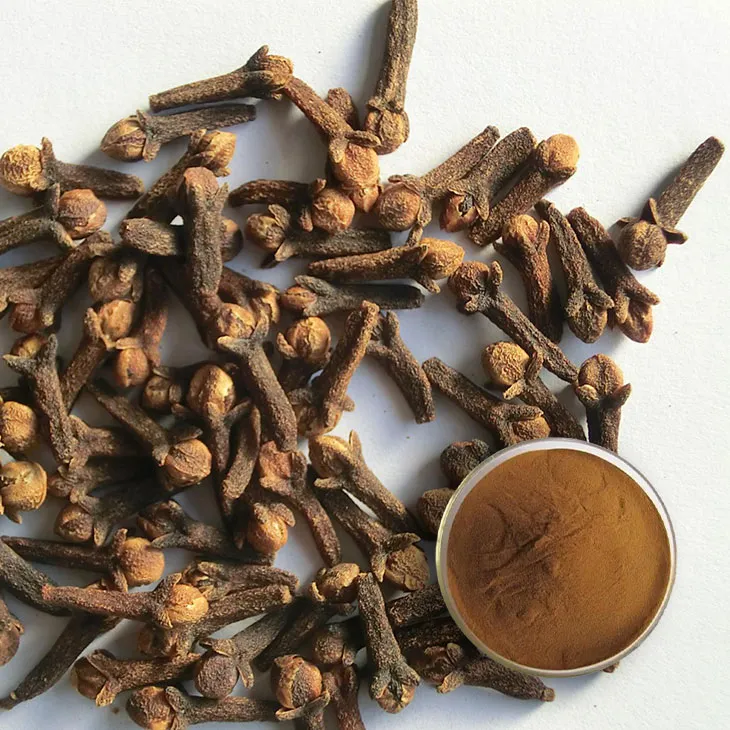- 0086-571-85302990
- sales@greenskybio.com
Two Bases of Clove Powder Quality: Potency and Purity.
2024-12-14

Introduction
Clove Powder is a popular ingredient in various industries, including food, medicine, and cosmetics. However, not all Clove Powder is of the same quality. Potency and purity are two crucial factors that determine the quality of Clove Powder. Understanding these two aspects is essential for both consumers and producers. This article will delve into the details of potency and purity, exploring what they mean, how they are measured, and why they matter.

Potency of Clove Powder
What is Potency?
Potency in clove powder refers to the strength or effectiveness of its flavor and active compounds. Clove contains a variety of bioactive substances, such as eugenol, which is responsible for its characteristic aroma and many of its medicinal properties.
Factors Affecting Potency
- Origin of the Cloves: Cloves from different regions may have varying levels of potency. For example, cloves grown in certain tropical regions with ideal soil and climate conditions may produce more potent cloves. The soil composition, amount of sunlight, and rainfall can all influence the development of the cloves and the concentration of their active compounds.
- Harvesting Time: The timing of the harvest is crucial. If cloves are harvested too early or too late, it can affect their potency. Harvesting at the optimal time ensures that the cloves have reached their maximum concentration of active ingredients.
- Processing Methods: How the cloves are processed into powder can also impact potency. Gentle processing methods that preserve the integrity of the active compounds are preferable. Harsh processing, such as over - heating or excessive grinding, may lead to the degradation of some of the bioactive substances in the cloves.
Measuring Potency
- Chemical Analysis: One way to measure the potency of clove powder is through chemical analysis. This involves techniques such as gas chromatography - mass spectrometry (GC - MS) to determine the concentration of key active compounds like eugenol. By accurately quantifying the amount of these substances, producers can ensure that their clove powder meets certain potency standards.
- Sensory Evaluation: Another important method is sensory evaluation. This involves trained panelists who assess the flavor intensity of the clove powder. They can detect differences in aroma, taste, and overall flavor strength, which are indicators of potency. Sensory evaluation is especially important for the food and beverage industries, where the flavor of clove powder can significantly impact the final product.

Purity of Clove Powder
What is Purity?
Purity in clove powder refers to the absence of impurities. These impurities can include foreign materials such as dirt, stones, and other plant parts that may have accidentally been mixed with the cloves during harvesting or processing. It also includes any chemical contaminants that may be present.
Factors Affecting Purity
- Harvesting and Handling Practices: Careful harvesting and proper handling of cloves are essential for maintaining purity. Workers should be trained to separate cloves from other debris during harvesting. If cloves are not properly sorted, it can lead to the inclusion of unwanted materials in the final clove powder.
- Storage Conditions: The storage environment of cloves before and after processing into powder can also affect purity. Cloves should be stored in a clean, dry, and well - ventilated place to prevent the growth of mold or the absorption of contaminants from the surroundings.
- Processing Equipment: The cleanliness of the processing equipment used to make clove powder is crucial. If the equipment is not properly cleaned between batches, it can introduce contaminants into the powder. For example, residual oils or substances from previous batches may mix with the new batch of clove powder.
Measuring Purity
- Visual Inspection: A simple yet effective method of assessing purity is visual inspection. This can be done at various stages of production. By examining the clove powder under good lighting conditions, one can identify any visible impurities such as foreign particles or discolored areas.
- Laboratory Testing: For a more accurate assessment of purity, laboratory testing is necessary. This may involve tests for heavy metals, pesticides, and other contaminants. Microscopic examination can also be used to detect the presence of any foreign plant materials or microorganisms that may be present in the powder.

Importance of Potency and Purity for Consumers
- Quality of End - Products: For consumers, the potency and purity of clove powder directly affect the quality of the products they use. In the food industry, high - potency clove powder can enhance the flavor of baked goods, beverages, and savory dishes. In cosmetics, pure and potent clove powder can provide effective skincare benefits without causing adverse reactions due to impurities.
- Health and Safety: Purity is especially important for health - related products. Impurities in clove powder, such as pesticide residues or heavy metals, can pose health risks. High - potency clove powder, on the other hand, ensures that consumers get the desired medicinal benefits when using clove - based remedies.
- Value for Money: Consumers also get better value for their money when they purchase clove powder with high potency and purity. They are paying for a product that is effective and free from contaminants, rather than a diluted or impure version that may not perform as expected.
Importance of Potency and Purity for Producers
- Market Competitiveness: Producers who can consistently deliver clove powder with high potency and purity have a competitive edge in the market. Consumers are more likely to choose products made with high - quality clove powder, which can lead to increased sales and brand loyalty.
- Compliance with Regulations: In many industries, there are regulations regarding the quality of ingredients. Meeting potency and purity standards is essential for producers to comply with these regulations. Failure to do so can result in legal issues and damage to the company's reputation.
- Product Consistency: Maintaining consistent potency and purity in clove powder production is crucial for product consistency. This allows producers to create products with reliable flavor profiles and performance characteristics, which is important for both consumer satisfaction and business success.
Conclusion
Potency and purity are two fundamental aspects of clove powder quality. They are influenced by various factors from the origin of the cloves to the final processing and storage. Understanding and controlling these factors is essential for both consumers and producers. Consumers can make more informed choices when purchasing clove - based products, while producers can ensure the quality and competitiveness of their offerings. By focusing on potency and purity, the clove powder industry can continue to thrive and meet the diverse needs of different sectors.
FAQ:
What is the significance of potency in clove powder quality?
Potency in clove powder is crucial as it determines the strength of its flavor and the effectiveness of its active compounds. A high - potency clove powder will have a more intense and characteristic flavor, which is important for various applications such as in cooking, baking, and in traditional medicine. The active compounds in cloves, like eugenol, are responsible for many of its properties, and a potent powder will have a higher concentration of these beneficial compounds.
How can one measure the purity of clove powder?
Measuring the purity of clove powder can be done through several methods. One common approach is through chemical analysis to detect the presence of impurities such as other plant materials, dirt, or pesticides. Microscopic examination can also be used to identify any foreign particles. Additionally, standardized tests for specific components of cloves can help determine if the powder contains the expected levels of pure clove - related substances, and thus assess its overall purity.
Why is purity important in clove powder?
Purity is important in clove powder because impurities can affect its quality, safety, and performance. Impurities like contaminants or foreign substances may introduce unwanted flavors, reduce the effectiveness of the active compounds, and in some cases, pose health risks. For consumers, pure clove powder ensures that they are getting the desired flavor and potential health benefits, while for producers, it is necessary to meet quality standards and maintain the reputation of their products.
How does the potency of clove powder influence its use in cooking?
The potency of clove powder greatly influences its use in cooking. A more potent clove powder will require less quantity to achieve the desired flavor in a dish. It can add a rich, warm, and spicy flavor to both sweet and savory recipes. However, if the potency is not considered, using too much or too little can significantly impact the final taste of the food. For example, in a spiced cake or a stew, the right potency of clove powder can enhance the overall flavor profile.
What are the common impurities found in clove powder?
Common impurities found in clove powder can include other plant parts from the harvesting process, such as stems or leaves. Dirt and debris may also be present if proper cleaning procedures are not followed during production. Additionally, there is a risk of pesticide residues if the cloves were not grown organically or if they were not properly treated to remove such residues. Another potential impurity could be mold or fungal spores if the cloves were stored in improper conditions.
Related literature
- Analysis of the Chemical Composition and Bioactivity of Clove (Syzygium aromaticum)"
- "Quality Assessment of Spices: Clove as a Case Study"
- "The Role of Potency and Purity in Spice Powder Evaluation: Focus on Clove"
- ▶ Hesperidin
- ▶ Citrus Bioflavonoids
- ▶ Plant Extract
- ▶ lycopene
- ▶ Diosmin
- ▶ Grape seed extract
- ▶ Sea buckthorn Juice Powder
- ▶ Fruit Juice Powder
- ▶ Hops Extract
- ▶ Artichoke Extract
- ▶ Mushroom extract
- ▶ Astaxanthin
- ▶ Green Tea Extract
- ▶ Curcumin
- ▶ Horse Chestnut Extract
- ▶ Other Product
- ▶ Boswellia Serrata Extract
- ▶ Resveratrol
- ▶ Marigold Extract
- ▶ Grape Leaf Extract
- ▶ New Product
- ▶ Aminolevulinic acid
- ▶ Cranberry Extract
- ▶ Red Yeast Rice
- ▶ Red Wine Extract
-
Passionflower Extract
2024-12-14
-
Polygonum multiflorum extract
2024-12-14
-
Nettle Root Extract
2024-12-14
-
Curcumin
2024-12-14
-
Beetroot Powder
2024-12-14
-
Cranberry Extract
2024-12-14
-
Curcuma Longa Extract/Turmeric extract
2024-12-14
-
Ginger Extract
2024-12-14
-
Bayberry Extract
2024-12-14
-
Soy Extract
2024-12-14





















